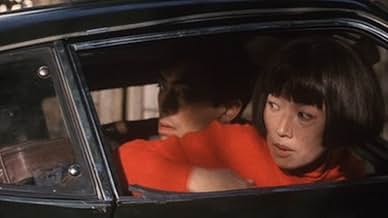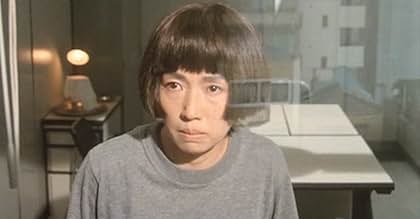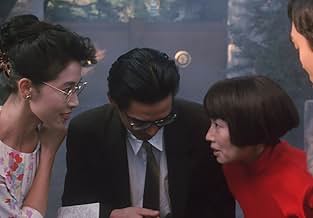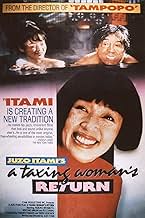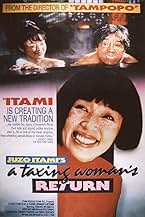Ryoko Itakura returns as the government tax agent willing to tackle the toughest cases. This time she takes on a fanatical but lucrative religious cult run by a vile lecher.Ryoko Itakura returns as the government tax agent willing to tackle the toughest cases. This time she takes on a fanatical but lucrative religious cult run by a vile lecher.Ryoko Itakura returns as the government tax agent willing to tackle the toughest cases. This time she takes on a fanatical but lucrative religious cult run by a vile lecher.
- Awards
- 2 wins & 4 nominations total
- Director
- Writer
- All cast & crew
- Production, box office & more at IMDbPro
Featured reviews
This sequel to the original is about the tax inspectors in Tokyo trying to find hidden money amongst a religious group, which at the time, in the age of Jim Bakker and Jimmy Swaggert, was a very topical subject. Nobuko Miyamoto is back as Ryoko, but she is more just one in an ensemble piece rather than a big star of the film. Still, she is a great character and great fun to watch. This film has more action than the first, but it is also a little confusing. You get a major peek inside what seems like a religious cult and you see the world of greed at your doorstep. If you saw the original, which was better since it had more Ryoko, you'll want to see this also. Its a worthy follow up and its a shame there weren't more films on the subject. I saw the two films within a few days of each other and I enjoyed them. I think you will too.
This sequel to the Taxing Woman takes on the corruption of politician, religious organization, and yakuza.
Ryoko (Nobuko Miyamoto) is on to a case concerning religious organization, and gangs concerning Jiageya ( A group of gangs who buys homes by using violent means so that real estate can be rebuilt and sold for a profit ). The case eventually leads to corrupt politicians. Ryoko enters the religious organization in question as its member, and finds out that its headquarter has a hidden room containing evidence of corruption.
The movie takes into account many topics that was suspected of being the case in society back in the '80s Japan. Itami connected the dots taking artistic license and turned it into a movie.
This movie is more entertaining than the first Marusa No Onna. The corruption is on a bigger scale, and investigation is more sophisticated.
This is one of the most entertaining movie by director Itami, and is recommended for viewing.
Ryoko (Nobuko Miyamoto) is on to a case concerning religious organization, and gangs concerning Jiageya ( A group of gangs who buys homes by using violent means so that real estate can be rebuilt and sold for a profit ). The case eventually leads to corrupt politicians. Ryoko enters the religious organization in question as its member, and finds out that its headquarter has a hidden room containing evidence of corruption.
The movie takes into account many topics that was suspected of being the case in society back in the '80s Japan. Itami connected the dots taking artistic license and turned it into a movie.
This movie is more entertaining than the first Marusa No Onna. The corruption is on a bigger scale, and investigation is more sophisticated.
This is one of the most entertaining movie by director Itami, and is recommended for viewing.
Juzo Itami's sequel to his popular 1988 comedy has energy to spare, but there's more than a hint of redundancy in the further adventures of his intrepid, freckle-faced tax agent and her one-woman war against corporate greed. The new film is even more exaggerated than its predecessor, with enough sex, skullduggery, intrigue, and action to fuel any three James Bond thrillers, but as with most sequels the novelty is gone, and the scenario is desperately over-plotted (to say the least). Contrary to the film's title the heroine herself doesn't even return until well into the second half-hour, and then in a more limited role. What made the character so appealing in the original was her resemblance to a pint-sized Popeye Doyle (with most of the same obsessions), but here's she's reduced to being just another cog in a very stylish, very busy machine, running more or less on autopilot.
"A Taxing Woman's Return" seems like a strange title for a movie, but somehow Juzo Itami makes Japanese tax investigation quite entertaining and interesting. The film has a carefully constructed, intricate plot and well-written screenplay; good acting and a *wonderfully* caustic sense of humor make this movie hilariously entertaining. Some of the best moments, though, come from showing how the fraudulent religious cult works (in evicting stubborn tenants, for example), and from Itami's gradual peeling away of plot layers to give us a peek at the never ending corruption in the system. This movie sits comfortably in my favorite 20 films.
I found this movie confusing in that I couldn't uniquely identify the characters. Also, the movie seems to switch gears (first it seems to be comical, then it is serious, then it is comical) and it can't seem to make up its mind about what it wants to be.
I did like some of the characters, but the movie was confusing and FAR to long.
I enjoyed Tampopo immensly but this film was dissapointing considering it was made by the same director.
Rating 4 out of 10
I did like some of the characters, but the movie was confusing and FAR to long.
I enjoyed Tampopo immensly but this film was dissapointing considering it was made by the same director.
Rating 4 out of 10
Did you know
- ConnectionsFeatured in Marusa no onnna 2 wo marusa suru (1988)
Details
- Release date
- Country of origin
- Language
- Also known as
- A Taxing Woman's Return
- Production company
- See more company credits at IMDbPro
Box office
- Gross US & Canada
- $333,584
- Runtime2 hours 7 minutes
- Color
- Sound mix
- Aspect ratio
- 1.37 : 1
Contribute to this page
Suggest an edit or add missing content


